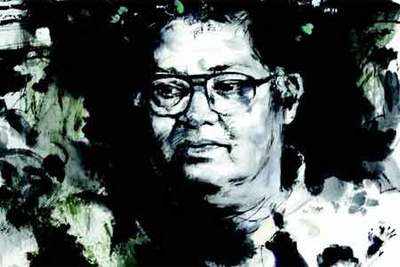Trending
This story is from October 26, 2012
Remembering Sunil Gangopadhyay
Is a poet an acquired taste? Kabir Suman remembers how he discovered and internalized Sunil Gangopadhyay in a piece for TOI.

Is a poet an acquired taste? Kabir Suman remembers how he discovered and internalized Sunil Gangopadhyay in a piece for TOI.
Erica Jong said in her novel Fear of Flying: “Courage, like caviar, is an acquired taste.” So is poetry. I would go a step further and say — a poet is an acquired taste, too.
In 1967 I was 18 and a college freshman. One day I saw on a Time magazine cover the picture of Ernesto Che Guevara lying dead.Later, I read a poem by Sunil Gangopadhyay. “Che, your death puts me to shame”. If I have to go by any definition of “poetry” I would prefer the one given by the Bengali poet Arun Kumar Sarcar: “Poetry is memorable utterances”. By saying so he brought things down to the quintessential. And, frankly, “Che, your death puts me to shame” was the first Sunil line or utterance that I found memorable. Was it because of my love for Che? Was it for any ideological reason? At the time of Che’s death I didn’t know much about him. I had just heard a few things here and there and read a few articles. That was all. When I looked at the Time magazine cover and saw his naked torso, his peaceful face, his eyes that were half open as though he refused to close them lest the enemies of the people all over the world elude his watchful vision, I felt ashamed. I can’t explain why. When I read Sunil’s “utterance” I could relate to him at once. That was possibly the moment. I discovered Sunil Gangopadhyay, the poet.
My university days in the latter half of the 1960s were an unforgettable medley of literature, music, class bunking and all-day adda at the arts college canteen, voraciously reading all books other than those included in the curriculum, giving private tutorials to schoolgoing kids at 30 per head, buying 3 shilling 6 pence books for about 6, falling in love but not being able to express it, craving for a single kiss that refused to transpire, getting ditched, smoking cigarettes as per Samar Sen’s Jobless Lover: “I listen to the sounds of ships at the Khidirpur docks by night/ God of Love, sleep doesn’t come, so I smoke cigarettes”. To be honest, it was not Sunil Gangopadhyay but Samar Sen who addressed my urban Calcuttan sensibilities more when I was about 19 or 20. Sunil wrote sprawling lines with imageries galore and those imageries did not always remind me of Calcutta. Samar Sen was terse, more colloquial, less ostensibly poetic.
But when those medley days were over and when sounds of distant (hand-made) bomb blasts and gunfire sent telltale signals through the William Styron’s Confessions of Nat Turner and Graham Green’s Of Power and Glory and John Steinbeck’s Of Mice and Men nights — sleepless nights — and when the eerie silence that ensued was magically touched by the memories of intricate sargams by Ustad Amir Khan that I had just heard in one of his concerts at Rabindra Sadan, Calcutta, it was Sunil’s voice that crept upon my mind: Come and see for yourself, Nikhilesh, how I am living.
In those days we never said Sunil Gangopadhyay. Just Sunil would suffice. There was a friend who was a Krittibas addict. Sometimes he would enter the college canteen, make himself conspicuous by not joining the roaring adda that was going on and scream out a Sunil poem as though his act was a challenge he threw at us, those who, unlike him, didn’t think that Krittibas, a poetry periodical, initiated by Sunil Gangopadhyay in the 1950s, was the manifesto of our age.
I never bought any book of poems by Sunil. I didn’t have to. His poems were simply in the city air. There was always some fellow student, who over a cup or two of tea made in the students’ canteen by brewing tea-dust for hours and sweetened not with sugar but with molasses, would light a borrowed cigarette and state a poem by Sunil:
“This hand has touched Neera’s face, could I use this hand to commit a sin, ever again?”*
I could also see that to some young men (always men and not women) Sunil’s lines had become their own statements though in different contexts. “Thirty-three years have gone by/ nobody kept their word.” That’s one such example. Frankly, I found myself making this statement when I turned thirty-four.
Some of Sunil’s lyric phrases made their rounds on the lips of young men who, I included, visibly savoured the tactile imageries the poet had used: “You have washed
your breasts with dew.”
Although not Sunil Gangopadhyay but Samar Sen and Subhash Mukhopadhyay, Jibanananda Das, Sudhindranath Dutta, Alokeranjan Dasgupta and Shamsur Rahman (one or two of his books had just about arrived at a few bookstalls in South Calcutta) occupied me, some of Sunil’s poems had a mysterious effect on me which those of the others did not. Mysterious, because I couldn’t remember the lines well and, hence, they didn’t confirm to Arun Kumar Sarcar’s definition of “Poetry” that I espoused (memorable utterances) but at the same time their lyrical essence and their inner music did cast a spell on me. And this spell had a modern, urban and romantic touch that was entirely his own. It is possible that the combination of these three factors make his poetic personality stand out.
Should I call it fate that all along in my youth I had friends who were bohemians and who brought Sunil’s poems to me. When I, not quite fit following some major afflictions, look back today at age 63, while Sunil Gangopadhyay died at age 78, when I remember once in a while TS Eliot and whisper to myself “I grow old I grow old, I’ll wear the bottoms of my trousers rolled” and when my body aches waist downwards as I physically try to translate the second phrase into action, I remember Sunil:
“In the late evening glow swathing the hanging balcony,/ a ‘daring’ light had fallen on her face,/ and like a telegram,/ had instantly revealed Neera’s grace!”*
Is it possible that Sunil has given Calcutta a Neera who can never be personified, though lesser mortals who do not live their life in poetry or in any other art form keep looking for her and sweetly miss the point? Like Sudhindranath Dutta, Sunil, too wants his song to be worthy of “her” — a proposition unattainable, hence poetic. Neera: the romantic and philosophical dimension that could “sweeten our nights”, to quote from a Leonard Cohen song? Is Sunil’s Neera someone like Jibanananda Das’s Bonolota Sen or Cohen’s Suzanne — characters that permeate the existence of those who have savoured the poetry dedicated to those three?
Speculation may go on while at a nameless moment that suddenly seems to shimmer as the memory of an innocence that I lost long ago, out of nowhere Sunil comes:
“These lips have told Neera,/ ‘I love you’, once,/ could a deceit play on these lips ever again?/ Coming down the steps/ I remember, all of a sudden,/ that the most important words/ were yet to be said!”*
Yes, Sunil Gangopadhyay, as a poet that’s where you enter and that’s where you leave:
“Coming down the steps/ I remember, all of a sudden,/ that the most important words/ were yet to be said!”
I can’t say that your poems changed anything in my life or in the way I look at life. I don’t think I’ll rush to buy your complete poems if a weighty volume is published now following your departure. May be as in my student days I’ll again secretly wait for some young man to suddenly arrive and impart to me the aura of some of your modern-urban-romantic lines. Who knows, perhaps I prefer to hear your lines and phrases from the lips of young men whose eyes sparkle as they start to take your words on their lips and then close their eyes as though they were going to kiss a girl for the first time in their life, and sigh thereafter — a sigh that you seldom tried to hide in many of your poems. Since you are Sunil Gangopadhyay, I would even say that I wish your poems had intervened in the scheme of things that is ruling over us and destroying everything worth nurturing; that I wish some of your poems had touched the glorious struggle of our people, especially the women of Nandigram and Lalgarh. I wish you and I had again felt the same shame — you as the poet and I as your reader — on looking at the media photograph of Koteshwar Rao just as we shared our shame on Che Guevara’s death. But, at the same time, I am saying adieu to you with gratitude for the mysterious spell your poems sometimes cast on me and for the poem in which you once addressed Indira and gently, even compassionately, advised her not to take a window seat in the helicopter to aerially inspect the extent of damage caused by floods over huge areas, lest she, overwhelmed by such a sight from such an altitude might suddenly exclaim by mistake, “Oh, but how beautiful.”
Acknowledgement: * marked quotes are from a translation done by Sheila Sengupta
Erica Jong said in her novel Fear of Flying: “Courage, like caviar, is an acquired taste.” So is poetry. I would go a step further and say — a poet is an acquired taste, too.
In 1967 I was 18 and a college freshman. One day I saw on a Time magazine cover the picture of Ernesto Che Guevara lying dead.Later, I read a poem by Sunil Gangopadhyay. “Che, your death puts me to shame”. If I have to go by any definition of “poetry” I would prefer the one given by the Bengali poet Arun Kumar Sarcar: “Poetry is memorable utterances”. By saying so he brought things down to the quintessential. And, frankly, “Che, your death puts me to shame” was the first Sunil line or utterance that I found memorable. Was it because of my love for Che? Was it for any ideological reason? At the time of Che’s death I didn’t know much about him. I had just heard a few things here and there and read a few articles. That was all. When I looked at the Time magazine cover and saw his naked torso, his peaceful face, his eyes that were half open as though he refused to close them lest the enemies of the people all over the world elude his watchful vision, I felt ashamed. I can’t explain why. When I read Sunil’s “utterance” I could relate to him at once. That was possibly the moment. I discovered Sunil Gangopadhyay, the poet.
My university days in the latter half of the 1960s were an unforgettable medley of literature, music, class bunking and all-day adda at the arts college canteen, voraciously reading all books other than those included in the curriculum, giving private tutorials to schoolgoing kids at 30 per head, buying 3 shilling 6 pence books for about 6, falling in love but not being able to express it, craving for a single kiss that refused to transpire, getting ditched, smoking cigarettes as per Samar Sen’s Jobless Lover: “I listen to the sounds of ships at the Khidirpur docks by night/ God of Love, sleep doesn’t come, so I smoke cigarettes”. To be honest, it was not Sunil Gangopadhyay but Samar Sen who addressed my urban Calcuttan sensibilities more when I was about 19 or 20. Sunil wrote sprawling lines with imageries galore and those imageries did not always remind me of Calcutta. Samar Sen was terse, more colloquial, less ostensibly poetic.
His poems were in the air
But when those medley days were over and when sounds of distant (hand-made) bomb blasts and gunfire sent telltale signals through the William Styron’s Confessions of Nat Turner and Graham Green’s Of Power and Glory and John Steinbeck’s Of Mice and Men nights — sleepless nights — and when the eerie silence that ensued was magically touched by the memories of intricate sargams by Ustad Amir Khan that I had just heard in one of his concerts at Rabindra Sadan, Calcutta, it was Sunil’s voice that crept upon my mind: Come and see for yourself, Nikhilesh, how I am living.
In those days we never said Sunil Gangopadhyay. Just Sunil would suffice. There was a friend who was a Krittibas addict. Sometimes he would enter the college canteen, make himself conspicuous by not joining the roaring adda that was going on and scream out a Sunil poem as though his act was a challenge he threw at us, those who, unlike him, didn’t think that Krittibas, a poetry periodical, initiated by Sunil Gangopadhyay in the 1950s, was the manifesto of our age.
I never bought any book of poems by Sunil. I didn’t have to. His poems were simply in the city air. There was always some fellow student, who over a cup or two of tea made in the students’ canteen by brewing tea-dust for hours and sweetened not with sugar but with molasses, would light a borrowed cigarette and state a poem by Sunil:
“This hand has touched Neera’s face, could I use this hand to commit a sin, ever again?”*
I could also see that to some young men (always men and not women) Sunil’s lines had become their own statements though in different contexts. “Thirty-three years have gone by/ nobody kept their word.” That’s one such example. Frankly, I found myself making this statement when I turned thirty-four.
Some of Sunil’s lyric phrases made their rounds on the lips of young men who, I included, visibly savoured the tactile imageries the poet had used: “You have washed
your breasts with dew.”
Although not Sunil Gangopadhyay but Samar Sen and Subhash Mukhopadhyay, Jibanananda Das, Sudhindranath Dutta, Alokeranjan Dasgupta and Shamsur Rahman (one or two of his books had just about arrived at a few bookstalls in South Calcutta) occupied me, some of Sunil’s poems had a mysterious effect on me which those of the others did not. Mysterious, because I couldn’t remember the lines well and, hence, they didn’t confirm to Arun Kumar Sarcar’s definition of “Poetry” that I espoused (memorable utterances) but at the same time their lyrical essence and their inner music did cast a spell on me. And this spell had a modern, urban and romantic touch that was entirely his own. It is possible that the combination of these three factors make his poetic personality stand out.
Should I call it fate that all along in my youth I had friends who were bohemians and who brought Sunil’s poems to me. When I, not quite fit following some major afflictions, look back today at age 63, while Sunil Gangopadhyay died at age 78, when I remember once in a while TS Eliot and whisper to myself “I grow old I grow old, I’ll wear the bottoms of my trousers rolled” and when my body aches waist downwards as I physically try to translate the second phrase into action, I remember Sunil:
“In the late evening glow swathing the hanging balcony,/ a ‘daring’ light had fallen on her face,/ and like a telegram,/ had instantly revealed Neera’s grace!”*
Is it possible that Sunil has given Calcutta a Neera who can never be personified, though lesser mortals who do not live their life in poetry or in any other art form keep looking for her and sweetly miss the point? Like Sudhindranath Dutta, Sunil, too wants his song to be worthy of “her” — a proposition unattainable, hence poetic. Neera: the romantic and philosophical dimension that could “sweeten our nights”, to quote from a Leonard Cohen song? Is Sunil’s Neera someone like Jibanananda Das’s Bonolota Sen or Cohen’s Suzanne — characters that permeate the existence of those who have savoured the poetry dedicated to those three?
Speculation may go on while at a nameless moment that suddenly seems to shimmer as the memory of an innocence that I lost long ago, out of nowhere Sunil comes:
“These lips have told Neera,/ ‘I love you’, once,/ could a deceit play on these lips ever again?/ Coming down the steps/ I remember, all of a sudden,/ that the most important words/ were yet to be said!”*
Yes, Sunil Gangopadhyay, as a poet that’s where you enter and that’s where you leave:
“Coming down the steps/ I remember, all of a sudden,/ that the most important words/ were yet to be said!”
I can’t say that your poems changed anything in my life or in the way I look at life. I don’t think I’ll rush to buy your complete poems if a weighty volume is published now following your departure. May be as in my student days I’ll again secretly wait for some young man to suddenly arrive and impart to me the aura of some of your modern-urban-romantic lines. Who knows, perhaps I prefer to hear your lines and phrases from the lips of young men whose eyes sparkle as they start to take your words on their lips and then close their eyes as though they were going to kiss a girl for the first time in their life, and sigh thereafter — a sigh that you seldom tried to hide in many of your poems. Since you are Sunil Gangopadhyay, I would even say that I wish your poems had intervened in the scheme of things that is ruling over us and destroying everything worth nurturing; that I wish some of your poems had touched the glorious struggle of our people, especially the women of Nandigram and Lalgarh. I wish you and I had again felt the same shame — you as the poet and I as your reader — on looking at the media photograph of Koteshwar Rao just as we shared our shame on Che Guevara’s death. But, at the same time, I am saying adieu to you with gratitude for the mysterious spell your poems sometimes cast on me and for the poem in which you once addressed Indira and gently, even compassionately, advised her not to take a window seat in the helicopter to aerially inspect the extent of damage caused by floods over huge areas, lest she, overwhelmed by such a sight from such an altitude might suddenly exclaim by mistake, “Oh, but how beautiful.”
Acknowledgement: * marked quotes are from a translation done by Sheila Sengupta
End of Article
FOLLOW US ON SOCIAL MEDIA









